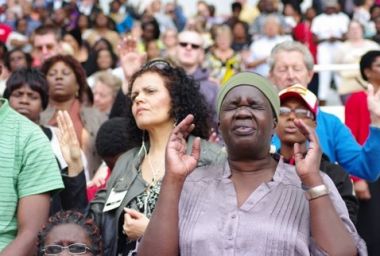Race: How even multi-ethnic churches still don't get it
A recent study has revealed an interesting trend in "multiethnic" churches. Rather than the presence of racial minorities resulting in more progressive ideas about race and inequality among white members of the congregation, it appears that views on these topics traditionally held by white people are being adopted by non-white congregants.

The American study asked participants the reason for socioeconomic differences between black and white people. While the majority of black churchgoers attending predominantly black churches gave structural reasons such as lack of access to quality education and discrimination, this percentage fell by around a third in black members of multiethnic churches. This brought their views into line percentage-wise with white members in these congregations.
Interestingly, whether the white participants attended a predominantly white church or not, the percentage of them blaming social inequality between the races on the "lack of motivation" among black people remained the same.
This comes as no surprise to myself and many others, both inside and outside of the church. I've written before about how the church needs to better challenge race-related issues within it. Yet, some who have read this study seem to have misunderstood it entirely: completely ignoring the concerns raised by the study's authors in light of the results, they instead suggest that maybe this is a good thing. They come to the naïve conclusion that minorities adopting the views and perception of the majority means that racism is less of a problem in those particular congregations, as if this is an ideal we should all be aiming for. They mistake a diverse congregation conforming to views that support the status quo for some sort of progression. But harmony and hegemony are not the same thing.
Multiethnic congregations are in the unique position of being one of the few meeting places for people of differing races and so they have unique potential to challenge the prevailing culture's attitude towards race. However, one of two things is happening. Either these congregations are only attracting ethnic minorities who already think in similar ways, or they are directly or indirectly influencing their non-white members to think about race and inequality the way that white people do.
This naturally raises questions about the racial and economic backgrounds of church leadership, as well as the space available for honest discussion about these topics within the walls of the church.
It is important to highlight that this is not simply a case of an increase in black congregants in multiethnic churches believing benign ideas about race that may or may not be true. We are talking about conclusions hinged upon historically racist and harmful views about black people. As the study points out, "congregations are not immune from the racial politics echoing outside their doors". Where we would hope that a large, ethnically diverse church would seize the opportunity to demonstrate a counter-cultural model of addressing race, instead we find churches influenced by "dominant racial ideologies" and pastors ironically suggesting that this is some form of success.
It would seem that people are ready to accept the pretty aesthetics of diversity in churches without the messy work of real racial reconciliation. This is a concept that is talked about more in American Christian circles than British ones, but it is just as relevant over here as it is in the US. Racial reconciliation will produce more diverse churches, but diverse churches do not necessarily produce or signify racial reconciliation. When confronted with calls for true racial reconciliation, some church leaders are tempted to implore us all to simply "focus on Jesus", assuring us that the rest will follow.
But the rest is clearly not following. Reconciliation is not about ignoring or minimising our differences or issues, it involves the labour-intensive job of working through offence and grievances. This never comes easily. If we look at salvation, the reconciliation of God and humanity came at great cost – although it was not our own. Similarly racial reconciliation is not a cheap endeavour, and it begins with the uncomfortable task of confronting and talking openly and honestly about the reality of race in our churches and communities.
Jendella is a writer, photographer and filmmaker based in London. Her work has appeared in The Guardian and also been exhibited internationally. She can be found on Twitter – @JENDELLA – and also atwww.jendella.co.uk.











